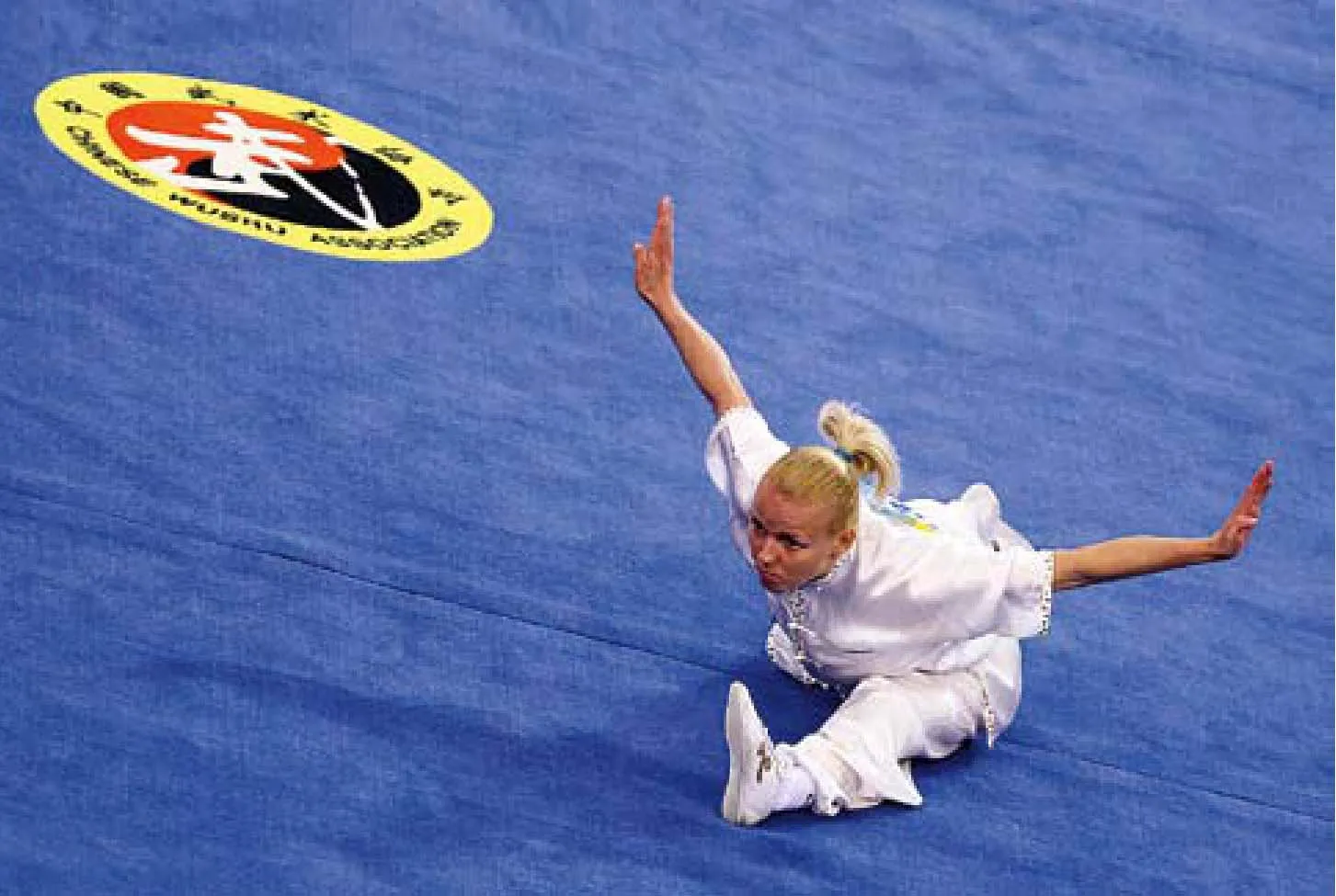Kungfu Stretches Out
2011-10-14ByWANGHAIRONG
By WANG HAIRONG
Kungfu Stretches Out
By WANG HAIRONG
Chinese martial arts grow in popularity outside Asia
In a quiet yard strewn with yellow leaves,Samuel Shamo practices kungfu. He is warming up for the new semester,starting in three days on September 6. Samuel is a student at Beijing Sport University.
Formerly cultivated for self-defence,wushu, or martial arts such as shadow boxing and swordplay, are now forms of physical culture.
“Wushu is part of China’s culture,”said Samuel from France. Last semester, he tooktaijiquan, a kind of traditional Chinese shadow boxing and this semester he is takingchangquanor long fi st.
Thoughwushuoriginated in China, it is practiced by many people in the world and has become an international sport.
Shamo used to practice yoga. After he met awushuinstructor, he decided to trytaijiquanand loved it. Before coming to Beijing,he had learnedtaijiquanin a martial arts school in Brest in Bretagne in France for three years. When he returns to France, Shamo hopes to teach the martial art to children there.
Internationalwushucompetitions are also held frequently. At the end of August, more than 50 athletes from 19 countries and regions took part inwushucompetitions during the SportAccord Combat Games 2010, the biggest sporting event held in Beijing since the 2008 Summer Olympic Games.
In addition towushu, the SportAccord Combat Games also featured 12 other sports such as aikido, boxing, judo, ju-jitsu, karate,kendo, kickboxing, sumo, taekwondo and wrestling. A total of 1,013 athletes from 106 countries and regions took part in the eightday event.
Film star Jackie Chan sang at the opening ceremony. He showed off his kungfu skills while singing. He was accompanied on stage by a group of martial arts practitioners from the United States, the UK and Canada.These fans studied martial arts at the Shaolin Temple and Wudang Mountains, two martial arts holy places.
Another famous martial arts star, Jet Li,served as the ambassador forwushuduring the games. He said he has practiced kungfu for nearly 40 years, and his understanding ofwushuis that it is not all about fi ghting, but an exercise and a way to build lasting friendships. In Chinese characters, the word “wu”is made of two characters that mean “stop fi ghting.” Li hoped the contestants would put more emphasis on improving their own skills,understanding the culture behind the sport and making friends.
Russian Tatiana Ivshina grabbed a gold with her fi erce fi sts and glistening knife, in thenanquan(southern fi st) andnandao(southern knife) event on August 28. Lindswell, an Indonesia girl pocketed a gold intaijiquanand Iranian athlete Farshad Arabi won the gold in men’snanquanandnangun(southern stick) event.
Athletes from Chinese mainland, Macao and Hong Kong took seven, two and one out of the total of 13 gold medals ofwushuevents, respectively.
Overseas dissemination
Kungfu movies have made Chinese martial arts popular outside China. Their popularity exploded as Bruce Lee became an international star in the 1970s, according to the United States of America Wushu Kungfu Federation (USAWKF), the official United States representative to the International Wushu Federation (IWUF).
Wushuwas fi rst brought to the United States during the California Gold Rush in the 1850s and 1860s. It was kept secret within the Chinese community until in the 1960s, when the community gradually opened it up to non-Chinese. In the 1970s,Bruce Lee brought kungfu onto the big screen, and to mainstream American and international audiences.
In the 1980s and 1990s, martial arts developed vigorously in the United States with the arrival of more martial artists from Chinese mainland, Hong Kong, Taiwan and Southeast Asia. Many of them opened martial arts schools.
Chan and Li came to Hollywood and wowed audiences with their great martial art stunts and performances. Chan continued his success in Hollywood withShanghai Noonin 2000 and a number of other hit movies.
Before going into movies, Li was a national wushu champion in China. The 1982 film,Shaolin Temple, swiftly turned him into a hot movie star. He further proved his acting talent with theOnce Upon a Time in Chinaseries. He later went to Hollywood and starred in popular kungfu movies such asRomeo Must Diein 2000 andThe Forbidden Kingdomin 2008.
Kungfu movies have increased foreign audiences’ understanding of Chinese martial arts, and kindled their interest in practicing kungfu.
Kungfu movieIp Man(2008) and its two sequels, which are loosely based on the story of Bruce Lee’s teacher, sparked a new surge of interest in Chinese martial arts. Some fans enrolled in localwushuschools to study.
IWUF has further promoted the spread ofwushuworldwide. Its schedule is crowded with world or regionalwushucompetitions.
Currently, IWUF has member federations in 135 countries and regions, with 30 in Africa, 21 in America, 38 in Asia, 42 in Europe and four in Oceania. In 1994, it was accepted as an of fi cial member of GAISF, the predecessor of SportAccord.

(Left)GRAND OPENING:Athletes at the opening ceremony of the SportAccord Combat Games 2010 on August 28

NEW STAGE:Liu Qi, Secretary of the CPC Beijing Municipal Committee,and Hein Verbruggen,President of SportAccord, open SportAccord Combat Games 2010 in Beijing
IWUF’s member federations organize and hostwushucompetitions and contribute to worldwide development of the sport.
The USAWKF, IWUF’s member federation in the United States, has created a national network of martial artists, schools,coaches and athletes dedicated to supporting kungfu. This network provides information,training and promotion for members and others interested in martial arts. On its website,there is a list of nearly 200 kungfu schools in the United States, Canada and Mexico.
An Olympic dream
Althoughwushuhas become more popular overseas, it has not yet been included in the Olympic Games. During the past decade,the IWUF has been working to achieve this goal.
Wushubecame a competitive medal event at the Asian Games in 1990 when Beijing was the host, yet when Beijing hosted the Olympic Games in 2008,wushumade no appearance at the games. Instead,WushuTournament Beijing 2008 was held on the sideline of the Beijing Olympic Games. Thewushutournament was participated in by a total of 128 athletes from 43 countries and regions.
During the recent SportAccord Combat Games 2010, severalwushuchampions said their dream is to compete at the Olympic Games. In an interview withThe Beijing News, Chan said that including Chinese martial arts in Olympics would promote Chinese culture. But he said he thought that the diversity ofwushustyles and schools was an obstacle towushubecoming an Olympic sport.
Li said thattaijiquanhas about 150 million practitioners all over the world, and its popularity should enable it to qualify as an Olympic sport. Because oftaijiquan’s simple philosophy and benefit to physical fitness,he expected that it could knock open the Olympic door in 10 to 20 years.
Wang Xiaolin, Secretary General of IWUF, said forwushuto be popular internationally, it should not be too complicated so that foreigners could easily understand it. He said the event design and competition rules should be reformed.

(Left)AGILE FIGHTER:Daria Tarasova from Russia competes in women’s changquan on day one of the SportAccord Combat Games 2010 on August 28 in Beijing

PRACTICE MAKES PERFECT:Samuel Shamo from France practices kungfu at Beijing Sport University on September 3
